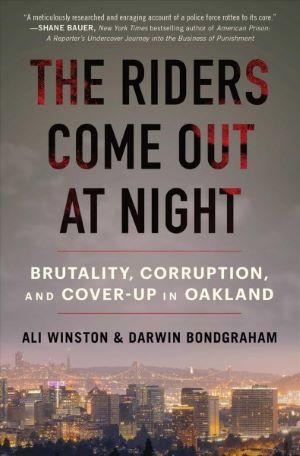The Riders Come Out at Night: Brutality, Corruption, and Cover-Up in Oaklandby Ali Winston & Darwin Bondgraham (2023, Atria Books, 467 pp., $30 HB)

As the brief list above suggests, and as the massive wave of protests in towns and cities across the land in the wake of the George Floyd killing confirms, thuggish, sometimes murderous cops are not just a Memphis problem. Almost every big city police department has its own legacy of scandalous brutality, much of it linked to the enforcement of drug prohibition. Oakland, California, is no exception.
In the case of the gritty East Bay city, it was the Riders scandal two decades ago that was so outrageous it generated mass protests, a criminal trial of the police involved, and a successful civil lawsuit that resulted in the Oakland Police Department force to operate under the supervision of a federal judge enforcing a consent decree.
In The Riders Come Out at Night, veteran investigative journalists Ali Winston and Darwin Bondgrahm use the Riders scandal as the fulcrum with which they pry open the inner workings of a police department long notorious for corruption and brutality. It's a tale not just of cop acting like criminals but also of a departmental culture more interesting in protecting its own than protecting the citizenry and elected officials more interested in playing "tough on crime" politics than ensuring that the police do not abuse the public.
Like the Memphis SCORPION unit now under the spotlight, the Riders were a specialized crime-fighting unit, celebrated for their aggressive tactics against drug dealers and other scofflaws and held up as an example for incoming rookie officers. A growing pile of police brutality complaints vanished into the police bureaucracy that was supposed to address them, and it took one of those rookie officers, sickened by what he was witnessing from his trainers, to finally bring the scandal into the open.
When it broke, it broke big, with four of the Riders eventually going to trial for the assaults and other crimes they committed (one of them fled and remains a fugitive to this day), only to escape criminal punishment after being vigorously defended by lawyers paid for by the police union. But they and the department could not escape a civil lawsuit filed on behalf of 119 Oakland residents that resulted in a federal consent decree forcing the department into oversight by a federal judge. That was 2003. The department remains under that consent decree to this day because it has been unable or unwilling to make the reforms necessary to satisfy the judge.
Since that 2003 consent decree went into effect, the Oakland PD has suffered renewed scandals on a regular basis, ranging from run of the mill police killings to the killing of four Oakland cops by one man in an incident that laid bare deficiencies in police training to the scandal around Oakland (and other) cops having sex with a troubled teen. And then there was the killing of Oscar Grant at the Fruitvale BART station—not by an Oakland cop but by a BART officer—and the Oakland Police's thuggish response to protests around that killing. And the spying on and attacks on Occupy protestors in 2011.
And on and on. It's as if the Oakland Police is a recidivist organization. The authors describe a culture within the department that has been historically racist, sexist, and anti-worker, dating back to anti-Chinese policing in the late 1800s, the Ku Klux Klan presence in the force in the 1920s, and the violent suppression of strikes in the 1930s. It bashed hippies in the 1960s and terrorized black Oaklanders in the 1980s and 1990s as it prosecuted the war on drugs.
It also generated a decades-long resistance movement, often led by the families of the people the department killed that has managed to impose reforms. And it eventually inspired the consent decree under which the department still labors, but it's always two steps forward, one step back.
As they examine this sordid history, Winston and Bondgraham concede that the department has changed, become less deadly and more transparent, and even occasionally capable of punishing miscreants within the ranks. But they argue that the transformations necessary to civilize policing in Oakland (and elsewhere) are greater than the institution of the police:
Whether policing in Oakland will ever get to the point where most people can agree it has been fundamentally transformed—no longer anything like the institution the Riders thrived in, no longer the force that terrorized Black Oakland after World War II and well into the 2000s—depends very much on whether there are broader societal shifts. So long as Oakland and the rest of America is riven by extreme race and class inequalities and the power of the federal government is not brought to repair the economies of destitute cities and rural areas, and deal with the intergenerational trauma that leads to despair and hopelessness, then it's very likely the police will continue serving more or less the same function they have for well over half a century: containing and repressing the symptoms of broader social problems through violence.
The Riders Come Out at Nightis thoroughly researched, compellingly written, and eye-opening. It is also an achingly timely examination of the role of police in society and how we figure out who will guard us from the guardians. This is a real contribution to the literature of policing in America, and it does not paint a pretty picture.
This work by StoptheDrugWar.org is licensed under Creative Commons Attribution-ShareAlike 4.0 International
Add new comment